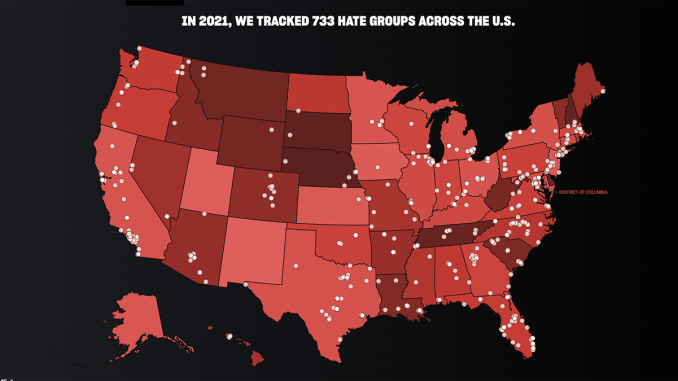
In order to win a defamation lawsuit, the person suing must convince the court and ultimately the jury that the slanderer didn’t just publish something false, but that he did so even while suspecting that the attack was false.
Immigration enforcement activist D.A. King’s lawsuit against the Southern Poverty Law Center made it to the discovery process while so many other lawsuits have failed precisely because King showed that the SPLC had reason to doubt the truth of its claim that his organization, the Dustin Inman Society, was an “anti-immigrant hate group.” In fact, the SPLC had explicitly stated that the society was not a “hate group” in 2011, but it reversed course in 2018, right after registering a lobbyist to oppose a bill the society supported.
As I wrote in my book “Making Hate Pay,” the SPLC routinely brands mainstream conservative and Christian organizations “hate groups,” putting them on a map with chapters of the Ku Klux Klan. This smear inspired a terrorist attack in 2012, but when conservatives sue to defend their good names in court, they repeatedly fail, in part because they do not allege that the SPLC itself doubted the “hate group” smear.
King can claim that, and newly revealed evidence bolsters his claim even further.
According to an article King unearthed on the SPLC website, not only did the SPLC state publicly that his group was not a “hate group” before it reversed course, but an SPLC whistleblower who went on to describe the SPLC’s “hate” accusations as a “highly profitable scam” had himself been involved in the SPLC’s monitoring of King’s organization. He even quoted a source who stated that an early version of King’s organization was not a “traditional ‘hate’ group.”
RELATED: SPLC to Face the Music for ‘Hate Group’ Defamation as Lawsuit Clears Major Hurdle
In 2019, the SPLC fired its co-founder, Morris Dees, amid a racial discrimination and sexual harassment scandal that barely made a blip in the legacy media. At the time, a former SPLC employee by the name of Robert Moser published an article, “The Reckoning of Morris Dees and the Southern Poverty Law Center” in The New Yorker.
Moser wrote about the guilt he “couldn’t help feeling about the legions of donors who believed that their money was being used, faithfully and well, to do the Lord’s work in the heart of Dixie. We were part of the con, and we knew it.” He wrote that SPLC staffers would chat “about the oppressive security regime, the hyperbolic fund-raising appeals, and the fact that, though the center claimed to be effective in fighting extremism, ‘hate’ always continued to be on the rise, more dangerous than ever, with each year’s report on hate groups.”
“‘The S.P.L.C.—making hate pay,’ we’d say,” he wrote. “It was hard, for many of us, not to feel like we’d become pawns in what was, in many respects, a highly profitable scam.”
Moser’s revealing article has become even more important since he published it in 2019. Moser himself wrote for the Intelligence Project, the SPLC division that produces the “hate group” list. In fact, he also wrote an article about King back in 2005, in which one of Moser’s sources said the first version of King’s organization—known as American Resistance—was not a hate group.
The SPLC has since removed that article from its website at some point between 2007 and 2016, according to the internet archive, but users preserved the article through screenshots. King tipped off The Daily Signal to the article’s existence.
Moser’s article used King’s favorite term for his home state—”Georgiafornia”—in the headline, but didn’t introduce the immigration activist until page 3. Instead, his article focused on a 54-year-old legal immigrant from Guatemala who reportedly suffered a violent attack at the hands of high school boys who pretended to offer him an hourly job. The article then turned to a Ku Klux Klan rally against Hispanic immigration in 1998, and neo-Nazi rallies in 2001 and 2002.
After this set-up, Moser finally brought up King, whom he introduced as “an ex-Marine from Marietta, a white-flight suburb just outside of Atlanta.” He noted that King organized counter-protests combatting left-wing groups, and claimed King’s activism featured a “white-victimhood theme.” He also wrote about King’s decision in 2003 to report illegal immigrants to what was then the Bureau of Immigration and Customs Enforcement, now known as ICE.
Perhaps most notably, Moser quoted Democratic state Sen. Sam Zamarripa, who sponsored a bill allowing illegal immigrants to obtain drivers licenses. King opposed the bill and publicly criticized the senator, who claims he received threats as a result.
“I think these people are operating just barely north of vigilante,” Zamarripa said. “They might not be traditional ‘hate’ groups, like the Klan, but that’s part of the appeal. They provide a safe, so-called respectable haven for hatred and bigotry.”

While Moser wrote that King worked with the Georgia Coalition for Immigration Reduction in the 1990s, King told The Daily Signal that he “was nearly unconscious politically in the 1990s and only heard about the very loosely organized Georgia Coalition for Immigration Reduction in 2003 after I had my first ever [letter to the editor] published in [the Atlanta Journal-Constitution].”
When King struggled to grow the American Resistance, he started The Dustin Inman Society instead, naming the group after a 16-year-old Georgia boy killed by an illegal immigrant in a car crash in 2001.
King’s initial lawsuit did not mention the article, and its later inclusion may strengthen his case even further.
Moser did not respond to The Daily Signal’s request to comment on whether he considered the “hate group” attack on King’s organization part of the SPLC’s “scam.” The SPLC also did not respond to a request for comment.
King’s organization is raising money for its legal defense on GoFundMe and the Christian crowdfunding platform GiveSendGo. While the SPLC has an endowment with more than $730 million, King had to mortgage his home to keep his organization afloat.
Have an opinion about this article? To sound off, please email letters@DailySignal.com and we’ll consider publishing your edited remarks in our regular “We Hear You” feature. Remember to include the url or headline of the article plus your name and town and/or state.

